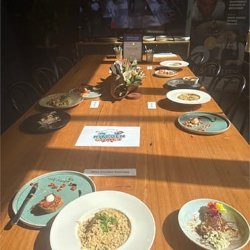How was 2020 for you? 2021 is the Year of the Ox. Having been born in the Year of the Ox, I want to make this a year in which I can be as strong as an ox, so I can take any difficulties in my stride, remain unmoved, and overcome them with a big heart.
Of course, the big news item for 2020 is the COVID-19 pandemic, so I have summarized here the COVID-19 responses and preventive measures taken in Australia last year.
Border closures: In Australia, borders (state borders) were closed to prevent the spread of infection. My state, Queensland, had fewer people infected than other states, so there was a period when Queensland stopped people from entering the state from the neighboring states of New South Wales, where Sydney is located, and Victoria, where Melbourne is located. And even when the border reopened, if you wanted to enter Queensland from another state, you had to get a pass called a Border Declaration Pass from a government website. Each state controls the closing and opening of its borders. Even when the Queensland state border reopened, border passes were checked by the police, so there were long traffic jams which made border crossings take more than two hours at its worst.
JobKeeper Payment: In Australia, government subsidies called JobKeeper payment were provided to employees who were laid off or had their work hours reduced and to business owners who were forced to reduce or shut down their operations due to the COVID-19 pandemic. There are conditions for receiving payments, but if you meet them, you can receive this wage subsidy. In the first stage of JobKeeper, when it started, the subsidy was $1,500 (about 130,000 yen) per person for two weeks and $3,000 (about 260,000 yen) for a month for up to six months from March to September, making it quite a generous subsidy. Don't you think it’s amazing that a person who received this subsidy from March could get $18,000 (about 1,560,000 yen)? In stage 2, which started on September 27, the amount was reduced from $1,500 to $1,200 for two weeks, but even still, they are planning to pay the subsidy until the end of March 2021 in stages 3 and 4, although there will be reductions and the conditions will be slightly different.
Check-in before entering restaurants: In Australia, customers at restaurants, cafes, and so on are required to complete a COVID check-in before entering. Each restaurant and so on has an information board with a QR code on it at the entrance, you read the QR code, then you enter your name, address, email address, and other details. At restaurants and so on that do not have a QR code, you fill out this information on paper before entering. If someone is infected, this information tracks which stores the infected person has been to and when, and it allows the authorities to gather information about the people who have been to any store that the infected person was in at the same time. You cannot refuse to check in because you don’t want to hand over personal information, for example, since it is a requirement imposed by the government. Anyone who doesn’t want to complete the COVID check-in can't enter the restaurant.
The longest lockdown in the world? A second wave of the COVID-19 infection ended up spreading across Melbourne and it was locked down for about 111 days until the end of October, when the number of infected people reached zero. People in Melbourne spent 111 days under strict conditions with the threat of a fine if they violated them. They had to stay at home, restaurants and cafes were closed, they couldn’t go more than five kilometers from home except for shopping and exercise, and they weren’t allowed to go out for entertainment. A lot of people criticized the lockdown saying it was too harsh, and the measures made the Premier of Victoria very unpopular. This lockdown is said to be the longest in the world. Everyone was overjoyed when the restrictions were lifted. I think they did well over such a long time.
While COVID-19 responses and measures differ in different countries, some of the measures to prevent the spread of infection in Australia have been in part a little coercive, yet I think the spread of the infection has been prevented thanks to those measures. We still can’t let our guard down, but we will be able to get through it together.
- 2021.01.28
- Responses to COVID-19 in 2020 - Summary




















































